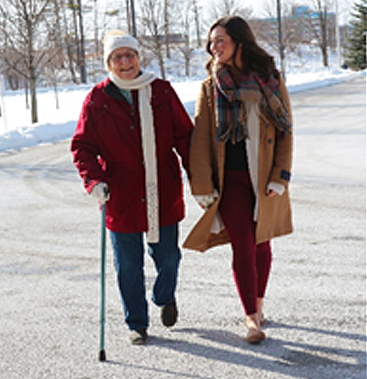
“I Never Thought He Would Get Lost”

Did you know that six in 10 people living with dementia become lost at some point? One of the most common statements we hear from caregivers is, “He has never wandered before, so I don’t think he ever will.” The reality is that just because someone has not wandered or gotten lost today does not mean that it will not happen tomorrow. Wandering refers to the need to keep on the move and is a common behaviour for a person with dementia. In itself, wandering is not a dangerous activity.
But short-term memory loss and impaired ability to reason or to make sound judgements can contribute to unsafe wandering behaviour, which can lead to getting lost. For many people, getting lost happens without warning. Familiar surroundings may suddenly become strange. They get disoriented and are unable to find their way home.
Here are some strategies to reduce the risk of your person getting lost:
- Ensure the person has some form of identification on them at all times. This may be a MedicAlert Safely Home bracelet or wallet identification card.
- Consider using a locating device, such as a cell phone or a GPS locating device or fob, which can be worn as a watch or necklace, or in a shoe, wallet or purse. You can use a smart phone to check and see where the person is at any time and receive alerts. There are many different types, and they can be purchased at most electronic stores or online.
- Ask neighbours, friends and family to call if they see the person wandering, lost or dressed inappropriately for the weather. Create a “business card” to give to neighbours with your contact info on it, so they can call you if they see the person.
- Create a list of places the person might try to go to, such as past job locations, former homes, or any other favourite place.
- Have an identification kit completed and available. See the resources offered by the Finding Your Way Ontario identification kit. It is important to have a plan in place so that if someone does go missing, you are prepared.
The following are some suggestions for what to do if your person goes missing:
- Call 911 as soon as you notice the person is missing. This is an emergency. You are not “bothering” the police by calling them. The sooner you call, the more likely it is the person will be found unharmed.
- Give the police officers the information you have prepared in your identification kit. Provide a current photograph. Let them know what the person was wearing, and if there are any places you think they may have been heading.
- Make sure that someone stays at home in case the person returns. Ask friends and family to help look for the person.
Here are some resources you may find helpful:
- McCormick Dementia Services – Home Safety and Wandering Presentation – A presentation covering tips and strategies to keep your person safe.
- Finding Your Way Ontario Information Kit Application Form – A resource to help you gather important information in the event it is needed in an emergency.
- MedicAlert Connect Protect –A partnership between London Police Services and MedicAlert Canada that provides police with 24/7 access to the subscriber’s emergency profile. MedicAlert Safely Home bracelets are included in this program.